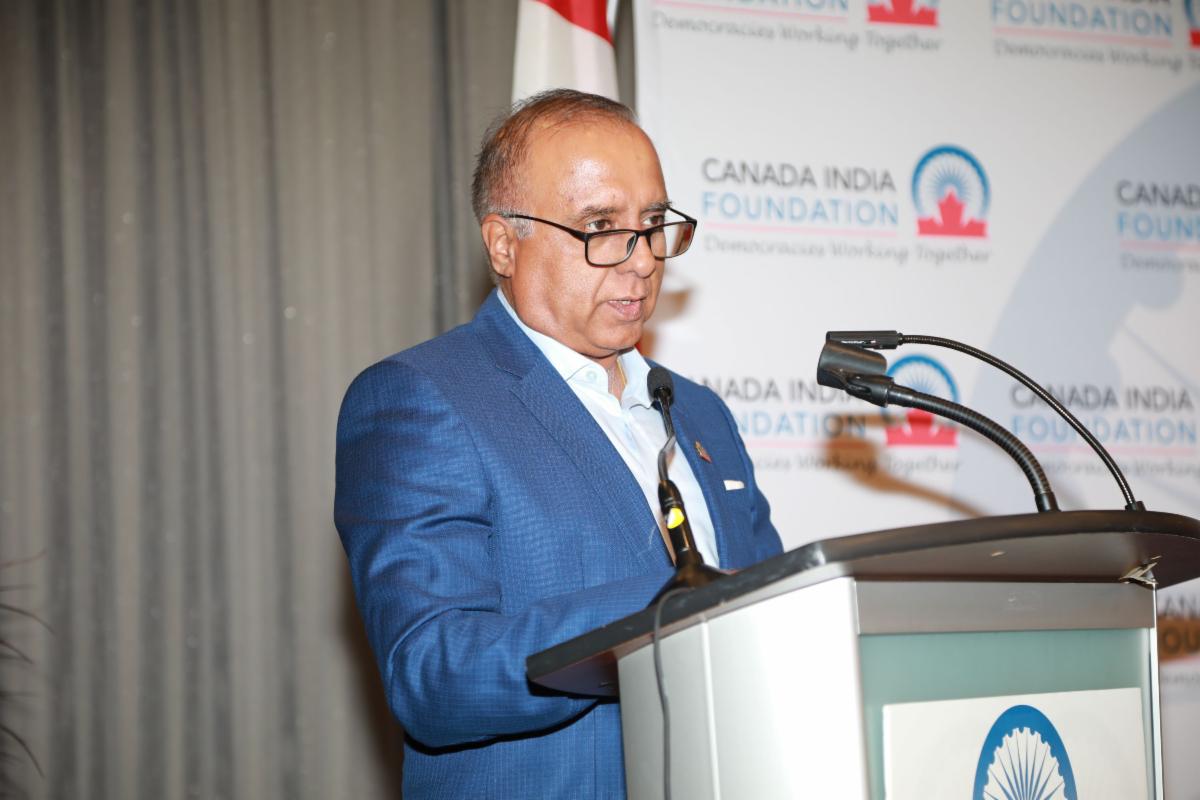| CIF Felicitates India’s Renowned Yoga Guru Dr. H R Nagendra |
 |
| Toronto, September 26, 2025: Canada India Foundation hosted a reception for one of the most consequential figures in modern times who brought about fundamental changes in the way the world perceived yoga. Often referred to as ‘Yoga Guru to Prime Minister of Bharat’, Dr. H.R. Nagendra is a fascinating human being who began his professional life as a space scientist with NASA but decided to move back to his motherland Bharat in the early 1980s to devote his life to a deep study of yoga and a search for truth. He was instrumental in creating the world’s first formal educational institution in Bengaluru, dedicated to the study of yoga – Swami Vivekananda Yoga Anusandhana Samsthana, abbreviated S-VYASA. |
 As Pankaj Dave, National Convener, CIF, put it during his welcome address, “Yoga is about transforming individuals and societies, and Dr. Nagendraji’s contribution in this field has been immense.” He added, “As a space scientist he could’ve scaled the lofty heights of the scientific world if he had stayed back at NASA. But instead, he decided to go back to India in the 80s when it was not quite the hot destination that it is now.” As Pankaj Dave, National Convener, CIF, put it during his welcome address, “Yoga is about transforming individuals and societies, and Dr. Nagendraji’s contribution in this field has been immense.” He added, “As a space scientist he could’ve scaled the lofty heights of the scientific world if he had stayed back at NASA. But instead, he decided to go back to India in the 80s when it was not quite the hot destination that it is now.” |
 Kapidhwaja Pratap Singh, Acting Consul General of India in Toronto, noted that it took the combined efforts of several people and organizations to arrange the visit of Dr. Nagendra to Canada, a man, according to Singh, “is a shining example for those who believe that yoga is a science”. “The more people accept it as science, the better it is for the world,” he said.He noted yoga’s role can fit in well into the bilateral relationship to strengthen it. “As more challenges come up in allopathic healthcare, we are going to need it even more.” Singh also lauded Canada India Foundation for the pioneering work it has done to promote yoga and Ayurveda in Canada. Kapidhwaja Pratap Singh, Acting Consul General of India in Toronto, noted that it took the combined efforts of several people and organizations to arrange the visit of Dr. Nagendra to Canada, a man, according to Singh, “is a shining example for those who believe that yoga is a science”. “The more people accept it as science, the better it is for the world,” he said.He noted yoga’s role can fit in well into the bilateral relationship to strengthen it. “As more challenges come up in allopathic healthcare, we are going to need it even more.” Singh also lauded Canada India Foundation for the pioneering work it has done to promote yoga and Ayurveda in Canada. |
 Dr. Lorenzo G Cohen, a long-term associate of Dr. Nagendra in path-breaking clinical trials, explained the research findings that led to the current adoption of yoga in most US cancer hospitals. Cohen is a professor in the Department of General Oncology and Behavioral Science and the director of the Integrative Medicine Program at the University of Texas MD Anderson Cancer Center. He is also a Founding Member and past President of the Society for Integrative Oncology. He recalled his early days in mind-body research on a grant issued by National Cancer Institute of Canada when very few institutions will entertain or support his ideas. In 1997, he moved back to Houston and formed the Integrative Medicine program there in 2002. Around that time, he came into contact with the S-VYASA Yoga University and its Founder, Dr. Nagendra. “Yoga was not new to me. My grandmother was a yoga master. So, learning about Yoga University, (S-VYASA), dedicated to doing scientific research, specifically related to medicine, was a real treat and led to an incredible collaboration lasting over twenty years.” Dr. Lorenzo G Cohen, a long-term associate of Dr. Nagendra in path-breaking clinical trials, explained the research findings that led to the current adoption of yoga in most US cancer hospitals. Cohen is a professor in the Department of General Oncology and Behavioral Science and the director of the Integrative Medicine Program at the University of Texas MD Anderson Cancer Center. He is also a Founding Member and past President of the Society for Integrative Oncology. He recalled his early days in mind-body research on a grant issued by National Cancer Institute of Canada when very few institutions will entertain or support his ideas. In 1997, he moved back to Houston and formed the Integrative Medicine program there in 2002. Around that time, he came into contact with the S-VYASA Yoga University and its Founder, Dr. Nagendra. “Yoga was not new to me. My grandmother was a yoga master. So, learning about Yoga University, (S-VYASA), dedicated to doing scientific research, specifically related to medicine, was a real treat and led to an incredible collaboration lasting over twenty years.”As a result of the joint research they did, they published the results of randomized trials of yoga’s impact in cancer treatment in the British Medical Journal in 2004. “Since then, we have published many trials, showing how yoga allows patients to go through cancer treatment with fewer symptoms, less anxiety and less depression, and they have a higher probability of responding to treatment,” he informed the audience. He pointed out that yoga’s role in integrative cancer care has earned a level of acceptance in the US from its main body of clinical oncologists. However, he is disappointed that there is no such support forthcoming from hospitals in Toronto, a city he loves. “A practice like yoga could save the hospital system money and that should be something that we should care about to keep the wonderful socialized medical system that we have here.” |
 Dr. Manjunath Sharma, Vice Chancellor of S-VYASA University thanked Dr. Nagendra for creating the right foundation for yoga for its easier adoption by modern science. He noted how their research, coordinated with institutions worldwide, have created an impressive of body evidence, numbering a little over 1500 papers since 1984. The world’s first and only yoga university that he currently heads, has 10,000 students enrolled, up from a mere 70 in 2002. According to Sharma, Dr. Nagendra’s name figures in Stanford University’s annual list of the worlds top 2% of research scientists and that shows the far-reaching contributions of Dr. Nagendra and is a recognition of yoga research as a legitimate scientific endeavour. Dr. Manjunath Sharma, Vice Chancellor of S-VYASA University thanked Dr. Nagendra for creating the right foundation for yoga for its easier adoption by modern science. He noted how their research, coordinated with institutions worldwide, have created an impressive of body evidence, numbering a little over 1500 papers since 1984. The world’s first and only yoga university that he currently heads, has 10,000 students enrolled, up from a mere 70 in 2002. According to Sharma, Dr. Nagendra’s name figures in Stanford University’s annual list of the worlds top 2% of research scientists and that shows the far-reaching contributions of Dr. Nagendra and is a recognition of yoga research as a legitimate scientific endeavour. |
| During the fireside chat anchored by Ritesh Malik, Chair, CIF, Dr. Nagendra reminisced about his decision to move back to India after a successful career as a scientist in the West. “Whether the present way of searching for reality is adequate to really get at reality, has always been a question that I asked myself even during my doctoral studies. This quest took me to Prof. Satyanarayan Shastri, a great expert of Upanishad and he said, here’s a way – the Indian knowledge base. He made it seem so scientific that he was able to attract all of us, and that’s how I first entered this area. And my life changed. Even when I came here to British Columbia and later to the US, I was determined to follow this path.” Explaining the role of yoga and how it is not in conflict with modern science, Dr. Nagendra said, “Yoga is a broad vision of the reality. Science has been searching for the reality and has done work in understating the world around us. For hundreds of years, we have developed scientific methodology to understand this entire universe. A similar thing happened thousands of years ago with yoga. The Vedas are the result of scientific scrutiny and discussion by thousands of people who questioned each other and eventually agreed or accepted the key principles, same process that happens in scientific world today.” He said that while modern science is focused on the physical reality, yoga had delved deeper into subjects like the mind, emotions, and consciousness that find expression in the Vedas.He realized that India’s ancient knowledge can be very useful to meet modern day challenges. He narrated an early success in his quest to apply yoga to heal bronchial asthma that many Bengaluru residents suffered from. He and his team carefully put together the data and after initial resistance the British Medical Journal published the results in 1985. And that proved to him that yoga can be an effective complimentary system to modern medicine. The next forty years of his life has been spent in the relentless pursuit of that early ‘evidence’. |
 Dr. Nagendra also paid compliments to India’s Prime Minister, Narendra Modi, for giving the field of yoga and Ayurveda a tremendous boost within India as well take the message to the world. Their association goes back to the early eighties when Modi was a young politician and Dr. Nagendra figuring out the steps to take in his ‘search for reality’. Both ardent devotees of Swami Vivekananda, hit it off and the partnership has been a turning point for yoga in India. “Last year, almost 250 million people in India were said to be practising yoga.” Dr. Nagendra also paid compliments to India’s Prime Minister, Narendra Modi, for giving the field of yoga and Ayurveda a tremendous boost within India as well take the message to the world. Their association goes back to the early eighties when Modi was a young politician and Dr. Nagendra figuring out the steps to take in his ‘search for reality’. Both ardent devotees of Swami Vivekananda, hit it off and the partnership has been a turning point for yoga in India. “Last year, almost 250 million people in India were said to be practising yoga.”An interactive Q&A session followed when further aspects of yoga were discussed with the guests. |
 Sanjay Makkar, CIF Co-convener in his concluding remarks thanked Dr. Nagendra and the team at S-VYASA for the opportunity to present in its best version to the world. He noted, “We are talking about everyone on this planet, the old, the young and the ones being born now, they need to be guided and shown a meaningful way forward. Yoga as a complete system of living offers us a new horizon, and today after listening to Dr. Nagendra, we can be sure that there is hope. We just need to keep the faith – in Ayurveda and Yoga.” Sanjay Makkar, CIF Co-convener in his concluding remarks thanked Dr. Nagendra and the team at S-VYASA for the opportunity to present in its best version to the world. He noted, “We are talking about everyone on this planet, the old, the young and the ones being born now, they need to be guided and shown a meaningful way forward. Yoga as a complete system of living offers us a new horizon, and today after listening to Dr. Nagendra, we can be sure that there is hope. We just need to keep the faith – in Ayurveda and Yoga.” |
 Sunita Vyas, former National Convener and Board Member, CIF, excelled in her role as emcee, adding her own personal experience with yoga, to strengthen the core message of the evening. Sunita Vyas, former National Convener and Board Member, CIF, excelled in her role as emcee, adding her own personal experience with yoga, to strengthen the core message of the evening. |














